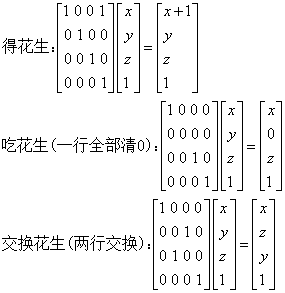| Time Limit: 2000MS | Memory Limit: 65536K | |
| Total Submissions: 9613 | Accepted: 2296 |
Description
Facer‘s pet cat just gave birth to a brood of little cats. Having considered the health of those lovely cats, Facer decides to make the cats to do some exercises. Facer has well designed a set of moves for his cats. He is now asking you to supervise the
cats to do his exercises. Facer‘s great exercise for cats contains three different moves:
g i : Let the ith cat take a peanut.
e i : Let the ith cat eat all peanuts it have.
s i j : Let the ith cat and jth cat exchange their peanuts.
All the cats perform a sequence of these moves and must repeat it m times! Poor cats! Only Facer can come up with such embarrassing idea.
You have to determine the final number of peanuts each cat have, and directly give them the exact quantity in order to save them.
Input
The input file consists of multiple test cases, ending with three zeroes "0 0 0". For each test case, three integers n, m and k are given firstly, where n is the number of cats and k is the length of the move
sequence. The following k lines describe the sequence.
(m≤1,000,000,000, n≤100, k≤100)
Output
For each test case, output n numbers in a single line, representing the numbers of peanuts the cats have.
Sample Input
3 1 6 g 1 g 2 g 2 s 1 2 g 3 e 2 0 0 0
Sample Output
2 0 1
Source

/*
稀疏矩阵乘法优化
*/
for (int i = 0; i < n; i++)
for (int j = 0; j < m; j++) {
if (!a[i][j]) continue; //稀疏矩阵乘法优化
for (int k = 0; k < b.m; k++)
tmp.a[i][k] += a[i][j] * b.a[j][k];
}
/*
ID: wuqi9395@126.com
PROG:
LANG: C++
*/
#include<map>
#include<set>
#include<queue>
#include<stack>
#include<cmath>
#include<cstdio>
#include<vector>
#include<string>
#include<fstream>
#include<cstring>
#include<ctype.h>
#include<iostream>
#include<algorithm>
#define INF (1<<30)
#define PI acos(-1.0)
#define mem(a, b) memset(a, b, sizeof(a))
#define For(i, n) for (int i = 0; i < n; i++)
typedef long long ll;
using namespace std;
const int maxn = 110;
const int maxm = 110;
const int mod = 10000;
struct Matrix {
int n, m;
ll a[maxn][maxm];
void clear() {
n = m = 0;
memset(a, 0, sizeof(a));
}
Matrix operator * (const Matrix &b) const {
Matrix tmp;
tmp.clear();
tmp.n = n; tmp.m = b.m;
for (int i = 0; i < n; i++)
for (int j = 0; j < m; j++) {
if (!a[i][j]) continue; //稀疏矩阵乘法优化
for (int k = 0; k < b.m; k++)
tmp.a[i][k] += a[i][j] * b.a[j][k];
}
return tmp;
}
};
int n, k, m;
void init(int n, Matrix &I) {
for (int i = 0; i <= n; i++) {
for (int j = 0; j <= n; j++) {
I.a[i][j] = 0LL;
}
I.a[i][i] = 1LL;
}
I.n = I.m = n + 1;
}
Matrix Matrix_pow(Matrix A, int k) {
Matrix res;
init(n, res);
while(k) {
if (k & 1) res = res * A;
k >>= 1;
A = A * A;
}
return res;
}
int main () {
Matrix A, I, res;
while(scanf("%d%d%d", &n, &m, &k)) {
if (m == 0 && n == 0 && k == 0) {
break;
}
A.clear();
A.n = n + 1; A.m = 1;
A.a[n][0] = 1LL;
char ch;
int u, v;
init(n, res);
while(k--) {
init(n, I);
getchar();
scanf("%c", &ch);
if (ch == 'g') {
scanf("%d", &u);
I.a[u - 1][n] = 1LL;
}
if (ch == 's') {
scanf("%d%d", &u, &v);
I.a[u - 1][u - 1] = 0LL; I.a[u - 1][v - 1] = 1LL;
I.a[v - 1][v - 1] = 0LL; I.a[v - 1][u - 1] = 1LL;
}
if (ch == 'e') {
scanf("%d", &u);
I.a[u - 1][u - 1] = 0LL;
}
res = I * res; //每次操作时,I应该乘在前面,因为矩阵乘法没有交换律
}
Matrix tmp = Matrix_pow(res, m);
tmp = tmp * A;
for (int i = 0; i < n; i++) {
printf("%lld ", tmp.a[i][0]);
}
cout<<endl;
}
return 0;
}
[POJ 3735] Training little cats (构造矩阵、矩阵快速幂),布布扣,bubuko.com
[POJ 3735] Training little cats (构造矩阵、矩阵快速幂)
原文:http://blog.csdn.net/sio__five/article/details/37344917